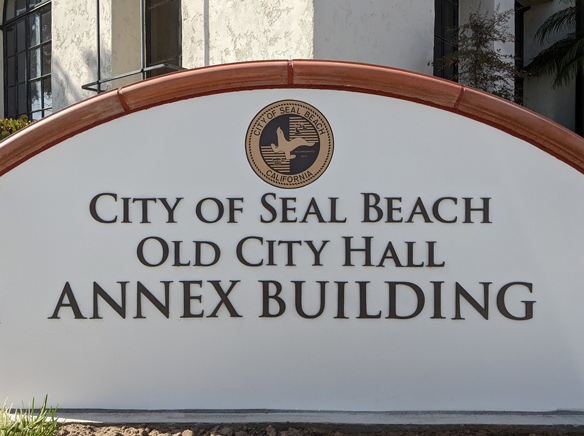First of two parts.
The City Council on May 28 received the recommendations of the Parking Committee. District Three Councilwoman Lisa Landau recused herself from the discussion because the Fair Political Practices Commission had not responded to her request for advice on a potential conflict of interest.
For now, there will be no paid parking on Main Street. Two council members support paid parking and two council members oppose paid parking. Due to the Memorial Day observance, the Sun will look at the council discussion in detail in next week’s issue.
“If the Council desires to establish a parking meter zone on Main Street and fix the rate of parking meter fees, then staff would return with an ordinance to implement the Council’s direction at a later date,” wrote Seal Beach Police Support Services Capt. Nick Nicholas in his staff report to the council.
According to the report, the committee recommended:
• No paid parking at the curb
• A comprehensive wayfinding signage program
• Expand bike parking
• Allow more parking time in the Main Street lots.
“Under this plan, the current rate would remain at $1 per hour, but the third hour would cost $3. This strategy aims to encourage parking turnover while also allowing visitors the option to extend their stay if necessary,” Nicholas wrote.
• Create a pilot program for loading and passenger pick up on Main Street.
The report also looked at paid parking.
Paid parking would require a formal council discussion after a public hearing.
(District Two Council Member Tom Moore proposed a moratorium on paid parking in May 2023. Moore proposed creating the Citizen-Council Parking Advisory Ad Hoc Committee in June 2023. The council created the committee by a vote of 3-2 in late July 2023. The dissenting votes were cast at the time by District One Council Member Joe Kalmick and District Five Councilman Nathan Steele.)
“If parking were priced uniformly at $1 per hour, the conservative, projected annual revenue is estimated to be $397,237. After accounting for equipment and operating costs, which amount to $182,950, the net gain for the city would be $214,287,” Nicholas wrote.
“Doubling the hourly rate to $2 could significantly increase the projected annual revenue to $795,922. With the equipment and operating costs remaining the same, the net gain would see a substantial rise to $612,972,” Nicholas wrote.
“Another option is to utilize the ‘Escalating Rate’ model, which is a structured parking fee system designed to manage parking demand and encourage turnover. Under this model, the first two hours of parking are priced at $1 per hour, making it affordable for short-term parkers who may be visiting for shopping or quick errands,” Nicholas wrote.
“To discourage longer stays and promote space availability, the cost increases to $2 for the optional third hour. This pricing strategy aims to strike a balance between allowing ample time for visitors to conduct their business while preventing the monopolization of spaces for extended periods,” Nicholas wrote.
“In terms of financial implications, the adoption of this escalating rate is projected to generate an additional approximately $24,000 in revenue per year, based on the assumption that 25% of parkers would opt for the third hour,” Nicholas wrote.
The report turned to costs of starting a paid parking program.
“The primary expense is the purchase of 20 pay stations, each costing $7,825, resulting in a total one-time purchase cost of $156,500,” Nicholas wrote.
“Additionally, there are ongoing expenses such as the monthly meter software fees, which amount to $45 per pay station. Over a year, this results in an annual cost of $10,800,” Nicholas wrote.
“Even with the startup costs, if parking were priced uniformly at $1.00 per hour, the projected annual revenue is estimated to be $397,237,” Nicholas wrote.




